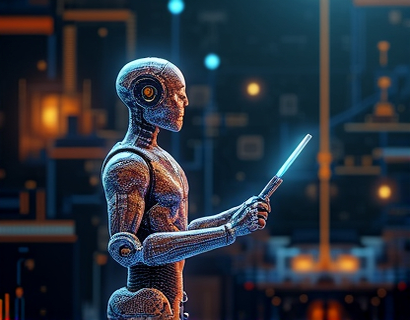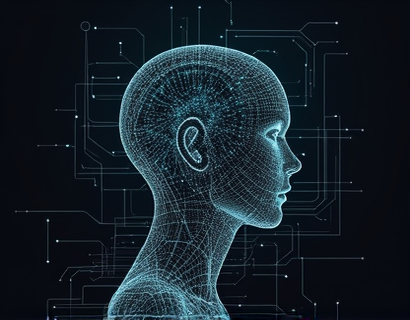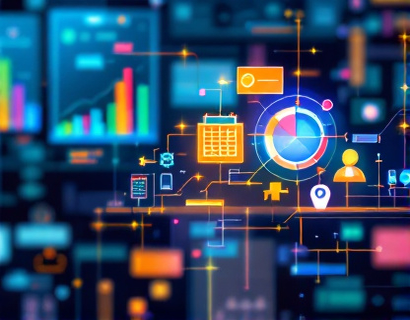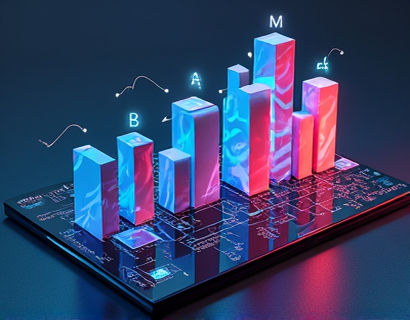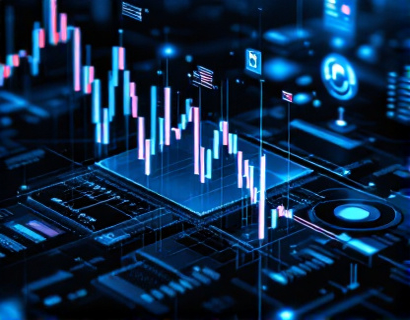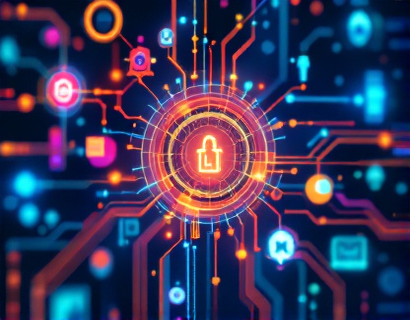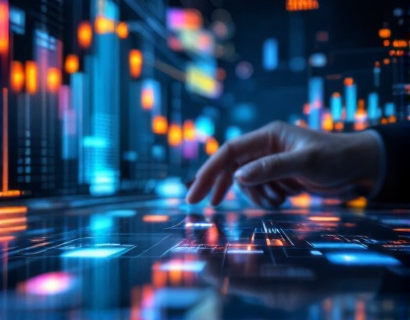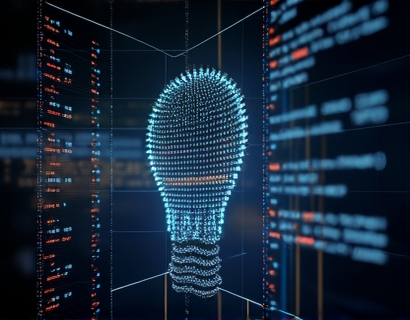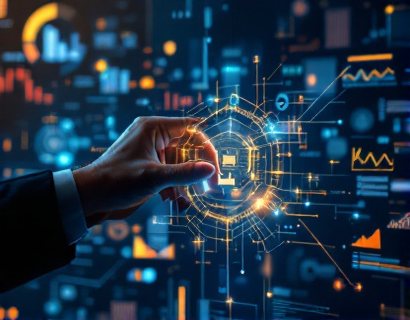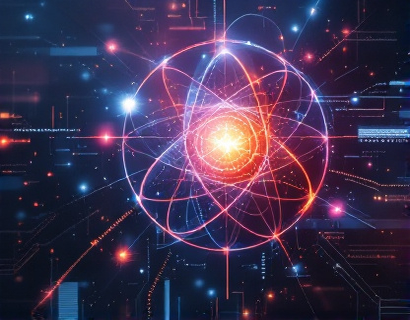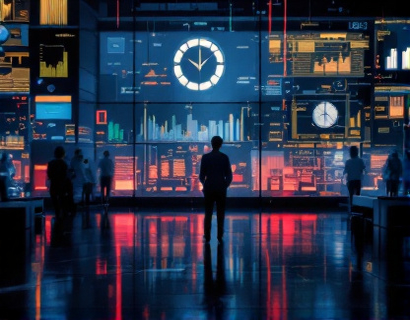Unlocking Next-Gen Digital Transformation: Leveraging AI and Blockchain for Advanced Solutions
The digital landscape is undergoing a profound transformation, driven by the convergence of artificial intelligence (AI) and blockchain technology. This synergy, often referred to as BlockchainAI, is revolutionizing the way businesses operate, offering unprecedented levels of efficiency, security, and innovation. As organizations seek to stay competitive in an increasingly digital world, understanding how to harness the power of these cutting-edge technologies is crucial. This article explores the intersection of blockchain and machine learning, providing insights into how these advanced solutions can enhance business operations and propel growth.
The Synergy of Blockchain and AI
Blockchain technology, known for its role in cryptocurrencies, offers a decentralized and immutable ledger that ensures transparency and security. When combined with AI, which excels in data analysis and predictive modeling, the potential for innovation becomes immense. The integration of these technologies creates a powerful framework that can address complex challenges across various industries.
The synergy between blockchain and AI lies in their complementary strengths. Blockchain provides a secure and transparent environment for data storage and transactions, while AI leverages this data to drive insights and automate processes. Together, they form a robust ecosystem that enhances trust, efficiency, and decision-making capabilities.
Enhancing Business Operations with BlockchainAI
One of the primary benefits of BlockchainAI is its ability to streamline business operations. Traditional processes often involve multiple intermediaries, leading to delays and increased costs. By utilizing blockchain, businesses can create smart contracts that automate and enforce agreements without the need for intermediaries. AI can further optimize these processes by analyzing data in real-time, identifying inefficiencies, and suggesting improvements.
For instance, in supply chain management, blockchain ensures the traceability and authenticity of products, while AI can predict demand, optimize inventory levels, and detect fraudulent activities. This combination not only reduces operational costs but also enhances customer satisfaction through faster and more reliable service.
Security and Trust in the Digital Age
Security has always been a paramount concern in the digital world. Blockchain's inherent security features, such as cryptographic hashing and consensus mechanisms, provide a robust defense against cyber threats. When integrated with AI, the security posture of an organization is further strengthened. AI can monitor network activities, detect anomalies, and respond to threats in real-time, reducing the risk of breaches and data loss.
Moreover, the transparency offered by blockchain ensures that all transactions are verifiable and tamper-proof. This level of trust is essential in industries dealing with sensitive information, such as healthcare and finance. By leveraging BlockchainAI, organizations can build a secure and trustworthy digital environment that fosters collaboration and innovation.
Innovation and Product Development
The combination of blockchain and AI is also driving significant advancements in product development. AI-driven design and prototyping can accelerate the development cycle, allowing businesses to bring innovative products to market faster. Blockchain ensures that the intellectual property and design data are securely managed and shared only with authorized parties.
In the realm of intellectual property management, BlockchainAI can create a decentralized platform where creators can securely upload, license, and monetize their work. AI algorithms can analyze market trends and consumer preferences, helping creators develop products that meet market demands. This synergy not only speeds up the innovation process but also ensures that creators receive fair compensation for their work.
Financial Services and Cryptocurrency Integration
In the financial sector, the integration of blockchain and AI is transforming traditional banking and financial services. Smart contracts on the blockchain can automate complex financial transactions, reducing the need for intermediaries and lowering transaction costs. AI can enhance these processes by providing real-time risk assessment, fraud detection, and personalized financial advice.
Cryptocurrencies, powered by blockchain, offer a decentralized and secure alternative to traditional currencies. AI can optimize cryptocurrency trading strategies, predict market trends, and manage digital wallets with enhanced security features. This combination is reshaping the financial landscape, making it more accessible, efficient, and inclusive.
Healthcare and Beyond
The impact of BlockchainAI extends beyond business and finance. In healthcare, blockchain can secure patient data, ensuring privacy and compliance with regulations like HIPAA. AI can analyze vast amounts of medical data to identify patterns, predict disease outbreaks, and personalize treatment plans. The integration of these technologies can lead to more accurate diagnoses, better patient outcomes, and more efficient healthcare systems.
In the realm of identity verification, BlockchainAI can provide a secure and decentralized solution, reducing the risk of identity theft and fraud. This is particularly relevant in industries such as banking, travel, and government services, where secure identity verification is critical.
Challenges and Considerations
While the potential benefits of BlockchainAI are significant, there are also challenges that organizations must address. One of the primary concerns is the technical complexity of integrating these technologies. Businesses need to invest in skilled personnel and robust infrastructure to implement and maintain these systems effectively.
Another consideration is the regulatory landscape. As blockchain and AI continue to evolve, regulatory frameworks are still catching up. Organizations must stay informed about compliance requirements and ensure that their implementations adhere to local and international laws.
Scalability is another challenge. While blockchain offers a secure and transparent environment, it can face performance issues as the volume of transactions increases. AI can help optimize blockchain networks, but ongoing research and development are necessary to address these scalability concerns.
Case Studies and Real-World Applications
Several organizations are already leveraging BlockchainAI to drive innovation and efficiency. For example, a leading logistics company has implemented a blockchain-based platform to track shipments in real-time, reducing delays and improving transparency. AI algorithms analyze traffic patterns and weather conditions to optimize routes, further enhancing efficiency.
In the supply chain industry, a major retailer uses blockchain to trace the origin and journey of products, ensuring authenticity and quality. AI-powered analytics help predict consumer demand, enabling the retailer to adjust inventory levels and reduce waste.
In the energy sector, a utility company has developed a blockchain-based platform for peer-to-peer energy trading. AI optimizes energy distribution, ensuring that renewable energy sources are utilized efficiently and sustainably. This not only reduces costs but also promotes environmental sustainability.
Future Outlook
The future of digital transformation is bright, with BlockchainAI poised to play a central role. As technology continues to advance, we can expect even more innovative applications across various industries. The convergence of blockchain and AI will likely lead to the development of new business models, enhanced user experiences, and unprecedented levels of efficiency and security.
Organizations that embrace these technologies early on will gain a competitive edge, positioning themselves as leaders in their respective fields. The key is to stay informed, invest in the right talent, and foster a culture of innovation and experimentation.
In conclusion, the integration of blockchain and AI represents a significant leap forward in digital transformation. By harnessing the power of these technologies, businesses can unlock new opportunities, drive growth, and shape the future of the digital world.








